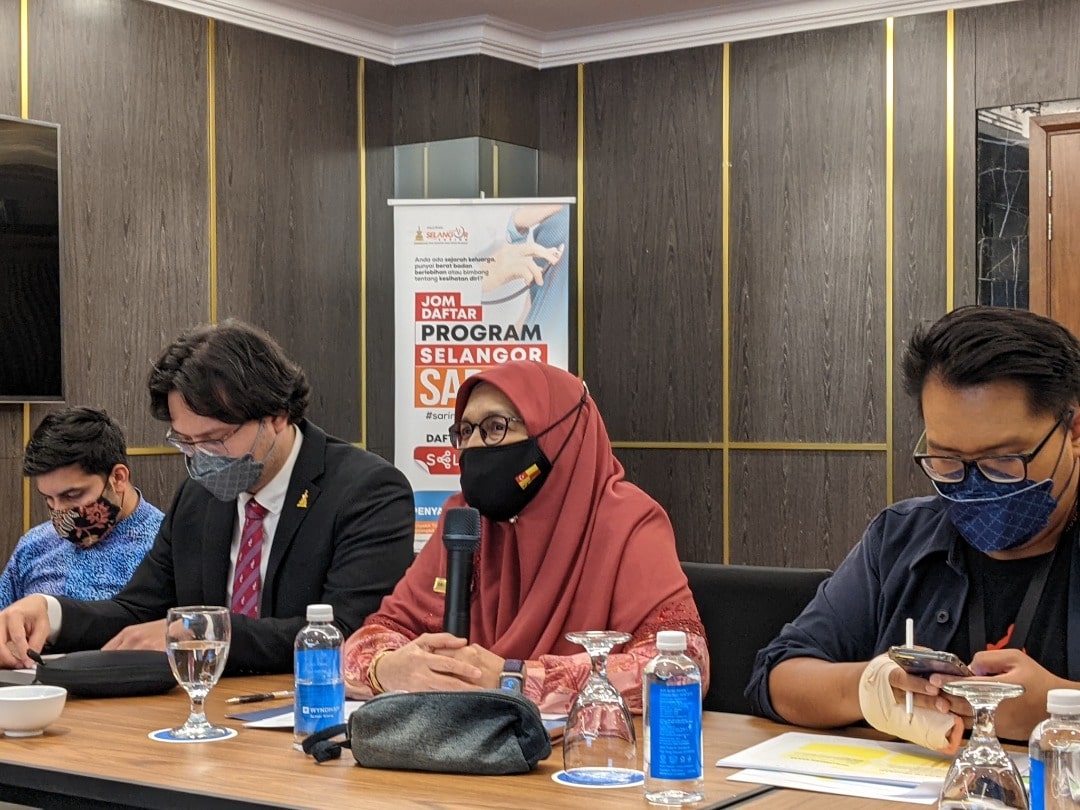KLANG, June 6 – With non-communicable diseases (NCDs) heightening the risk of severe Covid-19 and mortality, the Selangor state government is shifting its public health focus to disease prevention through its state-wide screening programme, Selangor Saring.
Selangor Saring aims to detect NCDs – mainly hypertension, diabetes, liver disease, and cancer – in people who “think” they are healthy, but may be at risk of chronic illness due to the person’s family history, unhealthy diet, physical inactivity, tobacco use, or alcohol misuse.
“What we saw with Covid-19 was all curative – people being placed in intensive care units (ICUs), given medication etc. Imagine if we can put an end to childhood obesity or prevent people from getting certain types of cancer through early detection.
“This will allow people to live longer by improving their quality of life,” said Selangor Task Force Operations director Dr Mohd Farhan Rusli, a public health medicine specialist, at a media briefing here on May 24.
The state government has set aside RM3.1 million for the state-wide screening programme to conduct some 112,790 diagnostic tests – consisting of physical examinations, blood and urine tests, eye examinations, cervical swabs, faecal occult blood tests (iFOBT), and mammograms.
The health screening is conducted for free and open to all Malaysian citizens who are born or live in Selangor, the country’s most populous state with an estimated 6.56 million people. Starting from Ijok in Kuala Selangor, the Selangor Saring programme will be held at different constituencies every weekend from May 22 until September 4.
The state has 56 constituencies. The next Selangor Saring programme was held in the Sabak (Dewan Tun Razak, Sabak Bernam) and Sungai Panjang (Dewan Simpang 5, Sungai Besar) constituencies last May 28.
Constituencies in the state’s most populous districts – Gombak, Klang, and Petaling Jaya – will have their screenings between July and September. The final screening will be held in Seri Serdang on September 4.
Selangor Saring Covers Confirmatory Diagnosis Costs
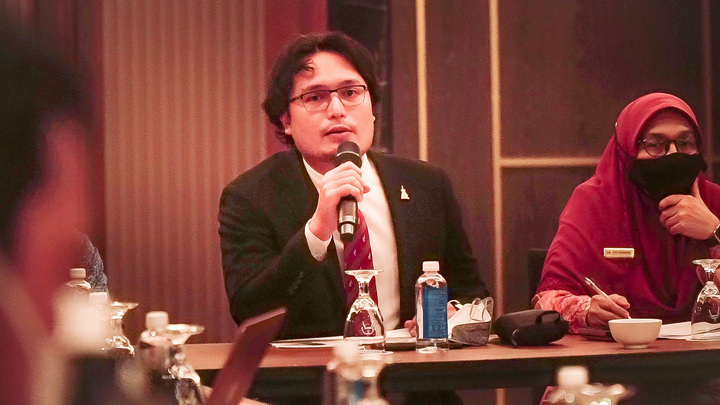
The state-sponsored programme covers not only the initial screening carried out in state constituencies, but up until confirmatory diagnosis, where further tests will be conducted to confirm or rule out a medical condition in the participant with concerning symptoms.
Participants who show symptoms in the initial screening will be referred to either a general practitioner (GP) or specialist at Selangor Saring panel clinics or hospitals for confirmatory diagnosis.
Cervical swabs, iFOBTs, and mammograms – provided under Selangor Saring – are screening tests that look for signs and symptoms of cervical cancer, colorectal cancer, and breast cancer respectively. Further tests are needed for diagnosis if the screenings show unusual results.
“The cost of the entire screening process, right up until confirmatory diagnosis, will be borne by the state government,” Dr Farhan said.
Depending on the disease, confirmatory testing and diagnosis can range from a few hundred ringgit to over RM2,000 for illnesses such as cancer and heart disease.
“These payments may sound a lot, but what we would like to emphasise here is if we don’t do these screenings and people don’t get absorbed into the health system, these individuals may end up not getting screened at all and may not know their condition until much later when their symptoms eventually appear.
“For example, in the case of colorectal CK (cytokeratin), if there is blood in the person’s stool, that often means it’s too late. So, the chances of survival are very low for them.
“For most cancers, if you are showing symptoms, you are likely in Stage Three of Four. It’s already late. That means we cannot do a lot of things to save the patient. We can do something, but it will most likely not save them,” Dr Farhan said.
Panel clinics and hospitals under the Selangor Saring programme include Selcare GP clinics, university hospitals — Hospital Canselor Tuanku Muhriz (formerly Hospital UKM) and Hospital UiTM — and private hospitals.
“The reason for this (selection of panel clinics and hospitals) is because we do not want to put any additional burden on the public health system. This will also help to speed up the confirmatory diagnosis process for the Selangor Saring programme.
“You don’t have to wait six to nine months to get a mammogram at a government hospital. We want our participants to get a mammogram in seven to 10 days so they can know their conditions quickly,” Dr Farhan said. “Our motto is the faster we know, the faster we can prevent it from being a more serious illness.”
How To Register For Selangor Saring
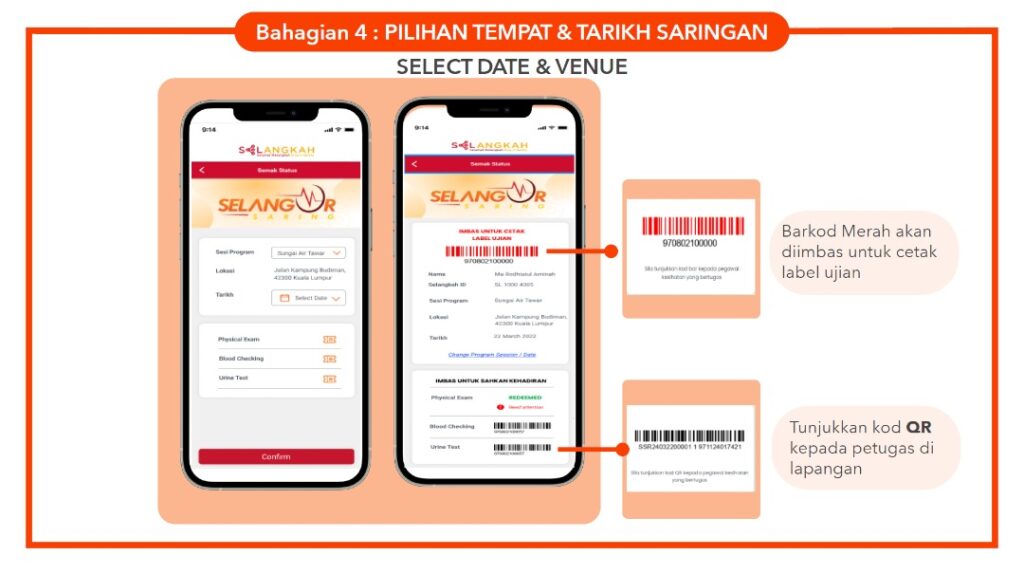
Individuals eligible for the Selangor Saring programme can register on the SELangkah app, as shown in this video tutorial.
The registration process involves setting up a user profile, responding to a survey that helps assess an individual’s disease risk based on their family history and other risk factors, electronic know-your-customer (e-KYC) authentication, and the selection of a preferred date and venue for a medical screening.
Once registered on the SELangkah app, individuals will be given a digital coupon with a red barcode. Registered participants will be required to show their barcode to the field officer on duty on the day of their medical screening.
Since registrations opened on May 9, the Selangor Saring programme has received approximately 7,400 applications to date, according to Selangkah Ventures Sdn Bhd chief information officer Dr Helmi Zakariah, who was also present at the briefing.
Those who miss their appointment can reschedule for another date at a different location on the app. For example, an individual who missed their appointment in Banting can change it to Kota Damansara. Once confirmed, a new set of digital coupons and barcodes will be issued.
Individuals without smartphones or those who face other technical issues can register for the programme via walk-in at community centres or at the screening sites.
All test results will subsequently be uploaded on the SELangkah app. For individuals without smartphones, their results will be delivered to by the Selangor Community Health Volunteers (SUKA).
Selangor Saring’s pilot programme at Ijok in Kuala Selangor saw only 75 participants coming to screen – just 15 per cent of its 500-participant quota for the constituency.
State Public Health, Unity, Women and Family Development Committee chairperson Dr Siti Mariah Mahmud, however, is optimistic that the numbers will rise as momentum builds and as Selangor Saring moves towards the state’s more populous districts.
Dr Siti Mariah said each state legislative assembly representative will help promote the initiative and get people in their constituencies to participate in the health screening programme.
Private GP clinics with no screening facilities, such as mammograms, can also get their patients to register for the programme, Dr Siti Mariah said. The media was told that the programme’s cervical cancer screening is nearing its quota of 990 tests.
What Happens On Screening Day
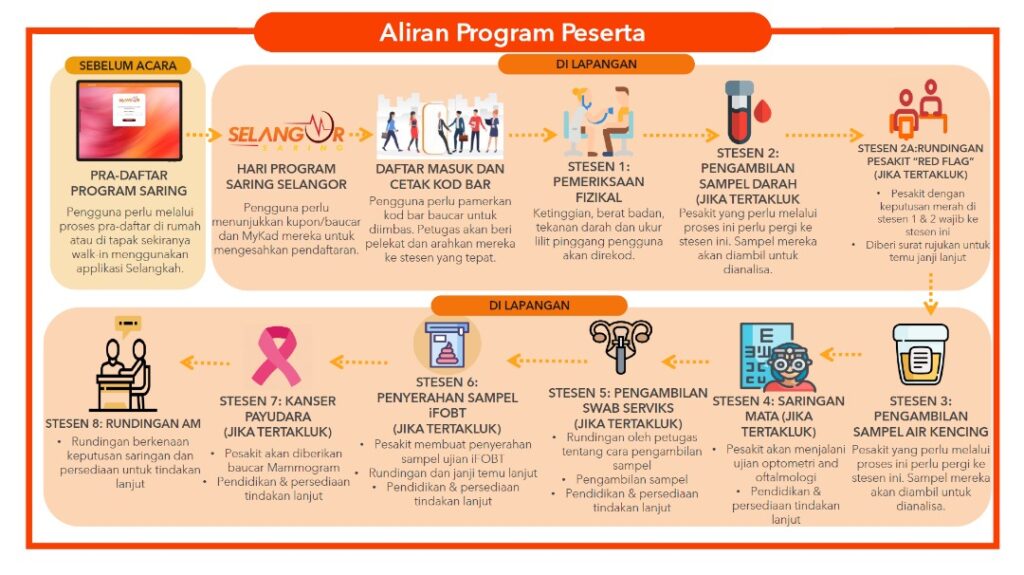
On the day of the screening, registered participants will have to present their coupons and MyKad for identification purposes. They will then be asked to scan their coupon barcodes.
The screening site will have eight stations: Station 1 is for physical examination, Station 2 (blood sample collection), Station 3 (urine sample collection), Station 4 (eye examination), Station 5 (cervical swab sample collection), Station 6 (faecal occult blood test collection or iFOBT), Station 7 (mammogram), and Station 8 (general consultation).
Aside from the physical examination, as well as blood and urine tests, not all participants will be subjected to the different medical examinations.
The pre-registration survey on the SELangkah app will determine an individual’s risk factor. Individuals with certain risks will receive additional barcodes on the SELangkah app for specific stations, though they can choose to opt out if they decide not to get tested.
“This is the scenario: we can’t determine if all those who apply for Selangor Saring have been screened previously or have never been diagnosed at all. Those who have never undergone any tests before will definitely have to take the blood and urine tests.
“Some people may be exempted from the (blood and urine) tests. Those who have been previously diagnosed, for example, will receive a follow-up examination instead,” Dr Helmi said.
Dr Farhan further explained that the pre-registration survey on SELangkah serves as a risk stratification tool that will guide participants to their respective stations.
“Say if we have six people registering on SELangkah, not all six will go through the same stations. One person may be at risk for certain things, another person has other risks so, it doesn’t mean you will get tested for everything.
“We will look at the risk factors – we will look at age, family history and so on. So, these details are provided through the survey on SELangkah. Once they have completed the survey then the relevant coupons will be issued showing which stations they should go to.
“That is what risk stratification is. We don’t want to screen everyone just because we can. We want to screen people who are at risk. Most people won’t know their risk factors but when asked through the survey, we can know that the person has a family history of stomach cancer or other disease – but that individual, in particular, may not have it.
“When we know these risk factors are there, there is genetic revolution, we can determine that this particular individual should go for certain tests,” Dr Farhan said.
Dr Siti Mariah Mahmud said participants should at least do the blood and urine tests.
“There’s a lot that a blood test can reveal – the state of your kidney etc. It’s a full blood test. It would be a waste if people opted out from the blood test because the information you can get from a urine test is limited compared to a blood test,” Dr Siti Mariah said.
Samples collected from the Selangor Saring programme will then be sent to Selcare Diagnostic Sdn Bhd’s lab for analysis. It was previously revealed that the Selcare diagnostics lab has a capacity to run 500 blood samples per hour and can also conduct polymerase chain reaction (PCR) tests and process up to 100 samples in four hours.
Getting Your Test Results Back, Lifetime Health Record On SELangkah
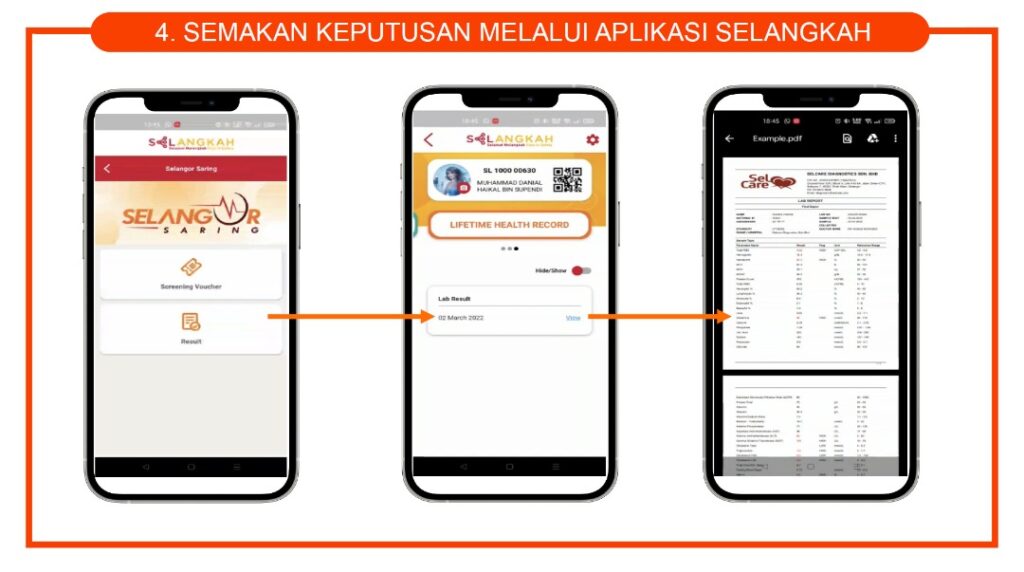
Depending on the tests, participants should receive their results on SELangkah within a couple of days or up to a week from the screening date. For blood and urine tests, the results should be out within 48 to 72 hours, while lab test results for cancer may take between five to seven days.
Dr Helmi, who is SELangkah developer, said all test results will be safely stored on Telekom Malaysia Bhd’s Cloud Alpha service that can be accessed by individual participants on the SELangkah app. “This is the first Selangor digital health record in Malaysia,” Dr Helmi said.
Dr Helmi, however, noted that the use of cloud services to store medical data is not new in Malaysia. “Many medical centres that have more than one hospital will usually store their data on cloud. For SELangkah, the cloud that we use is TM Cloud Alpha which is provided by Telekom Malaysia where its data farm or data warehouse is in Malaysia,” Dr Helmi said.
When asked about the security of the health data, Dr Helmi said that the SELangkah app is in compliance with the principles and guidelines in the Personal Data Protection Act (PDPA) 2010. Both federal and state governments, however, are currently exempted from the PDPA.
Section 3(1) of the PDPA, which is Malaysia’s main privacy law under the Communications and Multimedia Ministry’s jurisdiction, states that the Act “shall not apply to the federal government and state governments”.
Dr Helmi pointed out that the SELangkah app gives users the choice to delete their data if they decide to exit the ecosystem.
“We have created this function in the SELangkah app. So, if a user no longer wants to use the app, they can go to the ‘Profile’ section where they can apply to have all their data removed. So, with all these options, I believe we are in compliance with the principles and guidelines in the PDPA,” Dr Helmi said.
Dr Siti Mariah expressed the state government’s hope of creating a “lifelong health record” for people in Selangor through the Selangor Saring programme.
“Let’s say if I have an appointment with a doctor and I have the latest test results with me, that saves me from doing another round of tests. But if the doctor wants to conduct further tests, our plan, God willing, is to create a platform where doctors can also have the ability to add on to our health records.
“For people in Selangor with smartphones, this allows them to have their health records at any time and place. Any doctor can just have a look at when the patient had their last test, what the results were like, and can then offer the appropriate advice based on the patient’s latest medical record.
“That is our hope. We hope to have our health records accessible via smartphones, not in files in hospitals. Nobody has access to this except yourself, and it’s all stored in the cloud,” Dr Siti Mariah said.
Diagnosis Covered By Selangor Saring, Treatment Referred To MOH
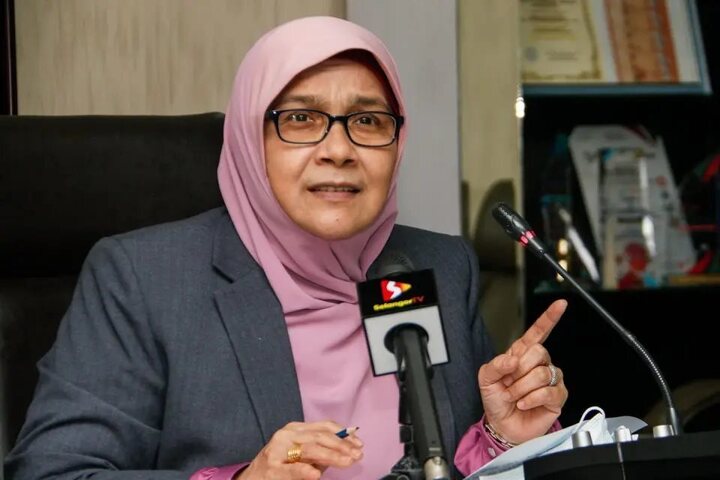
Participants who show certain symptoms in their screening will then be referred for confirmatory diagnosis.
“Everybody must understand that when we go and do these tests, they are all just tests – it’s not a diagnosis. You may test positive for human papillomavirus (HPV) but does it mean you have cervical cancer? No, absolutely not. The only thing that the results tell you is you have the HPV virus, but it doesn’t mean you have cervical cancer,” Dr Farhan said.
“If your iFOBT is positive, does it mean that you have colorectal cancer? No, it just means that you are now at risk of developing a certain disease.
“So, what happens when a participant’s iFOBT tests positive is it will activate our referral system so that the participant will get an appointment with a specialist at UiTM (panel for colorectal cancer).
“The participant will then show their test results on the SELangkah app. The doctor will also have access to the SELangkah system so that they know which constituency this patient is from, the kind of tests they did, and what came back positive.
“From there, the specialist will conduct further assessment to determine if colonoscopy is needed or not for confirmatory diagnosis,” Dr Farhan explained. “If the specialist identifies the disease, that is when it can be confirmed that this individual has colorectal cancer.”
“So, we do everything (up until confirmatory diagnosis), except the commencement of treatment because we don’t want to have any overlaps with the Ministry of Health (MOH),” Dr Farhan said.
“Our aim is to not screen for the sake of screening, but rather we want to make sure that the diagnosis is given to the patient,” Dr Farhan added. “The patient will then be included and absorbed into the MOH system where, if patients come from low-income households, they can be referred to government health clinics or public hospitals for follow-up treatment.”
Patients who prefer to seek treatment at private hospitals, can do so too.
Dr Siti Mariah said once diagnosis is confirmed, Selangor Saring patients aged 40 and above from bottom 40 per cent (B40) income households will be assisted in registering for the national Peka B40 scheme.
Peka B40 offers several benefits including a maximum RM20,000 medical equipment aid required in procedures or treatments such as stents for the heart, heart pacemakers, and intraocular lenses, as well as a RM1,000 incentive paid to cancer patients who complete their treatment at MOH hospitals.
“I believe the issue of delayed treatment will not arise once they are diagnosed. These patients will not be referred to health clinics or outpatient departments, but straight to specialist clinics,” Dr Siti Mariah told CodeBlue.
“In Selangor, we have the Bantuan Sihat Selangor [for financial assistance]. It is up to MOH to decant cancer patients to private hospitals for urgent treatment if the ministry is not able to cope with the number of cases,” Dr Siti Mariah said.
The Selangor state government has several health financing schemes available to assist people in Selangor seek medical treatment.
They include Selangor’s health aid scheme Bantuan Sihat Selangor, the Peduli Sihat health insurance scheme, the Rawatan Jantung Selangor scheme, and the Insentif Rawatan Tibi programme.
It was previously announced that Bantuan Sihat Selangor will be expanded to assist patients with thalassaemia, cancer, and other chronic diseases, as well as provisions that will cover transportation expenses and food supplements in addition to current support given for kidney dialysis, eye cataract surgery, minor surgeries, and medical equipment assistance.
At the national level, apart from Peka B40, there is the mySalam health protection scheme which offers coverage to eligible individuals for 45 critical illnesses, including cancer, heart valve surgery, blindness, and kidney dialysis or transplant.
For people working in the private sector, some individuals may qualify for the Social Security Organisation’s (Socso) invalidity scheme, while others can make withdrawals from their Employees Provident Fund (EPF) Account 2 to help cover their medical expenses.


